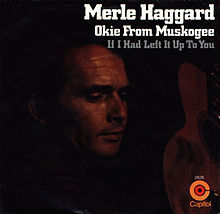- Okie from Muskogee (song)
-
"Okie from Muskogee" 
Single by Merle Haggard from the album Okie from Muskogee Released September 29, 1969 Format 7" Recorded July 17, 1969 (studio version) Genre Country Length 2:42 (studio version)
3:29 (live version)Label Capitol 2626 Writer(s) Roy Edward Burris
Merle HaggardProducer Fuzzy Owen Merle Haggard singles chronology "Workin' Man's Blues"
(1969)"Okie from Muskogee"
(1969)"The Fightin' Side of Me"
(1970)"Okie from Muskogee" is an American country music song performed by its co-writer, Merle Haggard. Released in September 1969, the song became one of the most famous of his career.
Contents
Background
Haggard told The Boot that he wrote the song in 1960 after being released from San Quentin Prison. He said that he became disheartened watching Vietnam War protests and incorporated that emotion and viewpoint into song. Haggard says, "When I was in prison, I knew what it was like to have freedom taken away. Freedom is everything. During Vietnam, there were all kinds of protests. Here were these [servicemen] going over there and dying for a cause -- we don't even know what it was really all about. And here are these young kids, that were free, bitching about it. There's something wrong with that and with [disparaging] those poor guys." He states that he wrote the song to support the troops.[1]
Critic Kurt Wolff wrote that Haggard always considered what became a redneck anthem to be a spoof, and that today fans - even the hippies that are derided in the lyrics - have taken a liking to the song and take humor in some of the lyrics.[2]
Written by Haggard and Roy Edward Burris (drummer for Haggard's backing band, The Strangers) during the height of the Vietnam War, "Okie from Muskogee" grew from the two trading one-liners about small-town life,[3] where conservative values were the norm and outsiders with ideals contrary to those ways were unwelcome. Here, the singer reflects on how proud he is to hail from Middle America, where its residents were patriotic, and didn't smoke marijuana, take LSD, wear beads and sandals, burn draft cards or challenge authority.[4]
While viewed as a satire of small-town America and its reaction to the anti-war protests and counterculture seen in America's larger cities, Allmusic writer Bill Janovitz writes that the song also "convincingly (gives) voice to a proud, straight-laced truck-driver type. ... (I)n the end, he identifies with the narrator. He does not position the protagonist as angry, reactionary, or judgmental; it is more that the guy, a self-confessed 'square,' is confused by such changes and with a chuckle comes to the conclusion that he and his ilk have the right sort of life for themselves."
Session personnel were James Burton, Roy Nichols and Jerry Reed on guitar; Chuck Berghofer on bass, and Ron Tutt on drums.
Chart performance and popularity
"Okie from Muskogee" immediately broke in popularity when released in late September 1969. By November 15, it reached No. 1 on the Billboard magazine Hot Country Singles chart, where it remained for four weeks. It also became a minor pop hit as well, reaching number 41 on the Billboard Hot 100 chart.
The version of "Okie from Muskogee" that reached No. 1 was the studio recording. After the song became widely popular, a live concert recording was issued and although that version never charted, it became very popular as well. The live version's distinguishing characteristics include a raucous crowd clapping and singing along with the chorus, and a voice yelling out, "Tell it like it is!" after the first verse.
"Okie from Muskogee" — along with the album, Okie from Muskogee — was named the Country Music Association Single of the Year in 1970.[5]
Chart positions
Chart (1969) Peak
positionU.S. Billboard Hot Country Singles 1 U.S. Billboard Hot 100 41 Canadian RPM Country Tracks 3 Cultural references
The song is played in the background in Platoon. When Bunny and Junior are in their barracks, Bunny laments to Junior about the other members of the platoon for smoking marijuana. This is actually a blooper in that this movie scene takes place in 1967, and the song was not released until 1969.
The song is referenced in the movie An Officer and a Gentleman.
Sources
References
- ^ Dunham, Nancy (11 October 2010). "Merle Haggard, 'Okie from Muskogee' - Story Behind the Lyrics". The Boot. http://www.theboot.com/2010/10/11/merle-haggard-okie-from-muskogee-lyrics/. Retrieved 13 October 2010.
- ^ Wolff, Kurt, "Country Music: The Rough Guide," Rough Guides Ltd., London; Penguin Putnam, New York, distributor. p. 424 (ISBN 1-85828-534-8)
- ^ Janovitz.
- ^ Malone, Bill, "Country Music U.S.A," 2nd rev. ed. (University of Texas Press, Austin, 2002), p.371.
- ^ [1] Country Music Association Awards Database — Merle Haggard.
See also
- Whitburn, Joel, "Top Country Songs: 1944-2005," 2006.
- Muskogee, Oklahoma
Preceded by
"To See My Angel Cry" by Conway TwittyBillboard Hot Country Singles
number-one single
November 15 – December 6, 1969Succeeded by
"(I'm So) Afraid of Losing You Again" by Charley PrideCategories:- 1969 singles
- Billboard Hot Country Songs number-one singles
- Merle Haggard songs
- Muskogee, Oklahoma
- Songs of the Vietnam War
- Songs written by Merle Haggard
Wikimedia Foundation. 2010.
